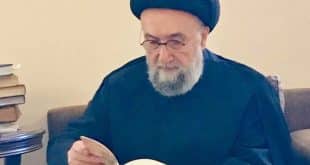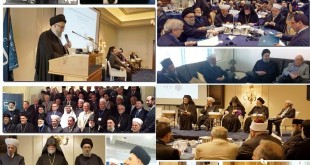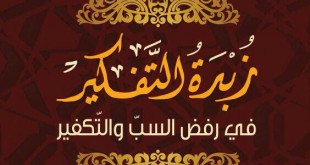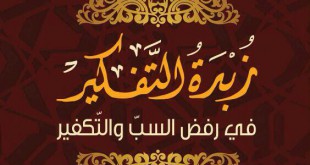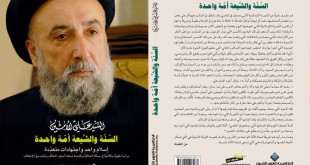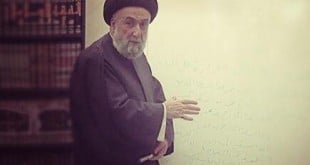Interfaith and Intercultural Dialogue
By H.E Sayyed Ali El-Amine
-United Nations Call to Adopt Dialogue and Issue a Schoolbook on Inter
-People Dialogue – The Perception of the “Other” and Clash of Civilizations
– Topics of Dialogue
I warmly welcome you all, and I thank the King Abdullah bin Abdulaziz Center for Interreligious and Intercultural Dialogue for its invitation and efforts led by Dr. Faisal bin Muammar and his team in organizing this successful conference. I hope this gathering achieves some of what we aspire to — spreading a culture of understanding, tolerance, coexistence, respect, cooperation, and peace among nations.
After these formalities… calling for dialogue between peoples and nations of different faiths and cultures is one of the defining features of our modern civilization and reflects the progress of human thought. Dialogue must be the model and example that guides the relationships between nations and peoples.
We believe that the essence of divine messages aims to honor humanity and strengthen the bonds of human brotherhood, steering people away from injustice and aggression. The core focus of all divine messages and the call of all prophets has always been the human being — whom God honored and whose love equates to loving God, as stated in the Quran: “And We have certainly honored the children of Adam” (Quran 17:70), and in the Gospel it is said: “Love of God cannot coexist with hatred of humanity.”
Had it not been for the existence of human beings, there would have been no need for sending prophets or establishing religions and scriptures.
With the development of political systems in our time, and the advancement of nations equipped with powerful means — especially military ones — the need for serious dialogue becomes even greater. Such dialogue can protect humanity from the dangers of war machines that threaten human existence and achievements. Only sincere dialogue can open the path to dispelling fears between nations and peoples.
We believe that the idea of dialogue among followers of different faiths, cultures, and civilizations must move beyond issues that now belong to history. Before the appearance of divine religions, humanity lived through centuries not free of differences and bloody conflicts. These continued after the advent of religion, sometimes occurring in the name of religion, and at other times under non-religious labels. These disputes did occur, and cannot be denied — but what can be denied is the connection of religion to them. Divine books representing true religion reject all such bloodshed and conflict among humans.
The holy scriptures say: *“Do not kill.”* This is conveyed to us in both the Old and New Testaments, and the Quran echoes the same message, quoting God as saying:
“Whoever kills a soul unless for a soul or for corruption [done] in the land – it is as if he had slain mankind entirely. And whoever saves one – it is as if he had saved mankind entirely.” (Quran 5:32)
And also:
“And do not transgress; indeed, Allah does not like transgressors.”(Quran 2:190)
It is solely the responsibility of individuals who misunderstood religion, or exploited its sacred principles for their own selfish motives, turning them into tools for inciting hatred and animosity in pursuit of power and control over others.
These wars that brought tragedies upon human societies were expressions of ambitions held by leaders consumed by the desire for leadership, authority, and expansion at the expense of others. Some wrapped themselves in the sacred cloak of religion to hide their unholy goals.
– Perception of the “Other” and Clash of Civilizations:
The diversity of nations and peoples is an existing reality, just as there is diversity among individuals and groups. Yet this diversity arises from a single unifying truth shared across all these differences — regardless of race, language, culture, or religion — and that is humanity, to which we all belong.
Divine scriptures affirm this common truth. As the Gospel says: “From the beginning He made them male and female”* (Matthew 19:4), and the Quran states:
“O mankind, indeed We have created you from male and female and made you peoples and tribes that you may know one another. Indeed, the most noble of you in the sight of Allah is the most righteous of you.” (Quran 49:13)
There is no doubt that diversity brings about differences in opinions, ideas, and beliefs among individuals, communities, and nations. There is hardly a nation or country without cultural, religious, or traditional particularities. However, this does not necessarily lead to conflict or hostility. There are many shared values that can serve as foundations for better relations built on a culture of dialogue that leads to mutual understanding, preventing global communities from falling into disputes, wars, and confrontations.
To say that there is “the Other” or “someone different from me” is to acknowledge the reality of diversity. It means someone different from you — but not necessarily someone opposed to you. Even though opinions, ideas, and beliefs may differ, we are equal in our shared humanity, which forms the basis for equality in rights.
When you say: “I live with others,” or “Others live with me,” or “I exist, and so does another,” this implies the presence of a partner in life and existence. At this point, religious teachings calling for human equality become relevant, as expressed in the Hadith: “Love for others what you love for yourself, and hate for others what you hate for yourself,”* and in the Gospel: “So in everything, do to others what you would have them do to you, for this sums up the Law and the Prophets.” (Matthew 7:12)
Thus, these teachings can be seen as a social contract governing relationships between individuals, communities, and nations — independent of religion, belief, language, culture, or race.
This concept of equality in rights is supported by many religious texts, such as:
– “People are equal like the teeth of a comb.”
– “All creation are God’s dependents, and the dearest to Him are those who are most beneficial to His dependents.”
– “There is no superiority of a red-skinned person over a black-skinned one, nor of an Arab over a non-Arab, except through piety.”
Although humans may differ in origin, race, religion, and background, they are united in their shared humanity — and in this regard, all stand equal.
Therefore, we reject interpretations that explain past and predict future wars and conflicts based on the inevitability of clashes between civilizations, religions, and cultures. In their essence, religions are one, and have significantly contributed to guiding humanity toward shared human values that bring nations together and unify perspectives on humanity and its rights, regardless of race or color.
Religions are inseparable from the formation of human civilization. At their core, they came to extinguish the fires of differences that arose in human society after the natural disposition was corrupted by greed, ambition, and the desire for domination and hoarding resources, as mentioned in the Quran regarding the mission of the prophets:
“…and We sent down the Book to you in truth, that you might judge between the people by that which Allah has shown you.” (Quran 4:105)
Reality confirms this. Many wars in ancient and modern history have occurred between nations and states belonging to the same civilization and the same religion. This clearly invalidates the theory of inevitable clash between civilizations, religions, and cultures.
Thus, we see that religion — in all its divine messages — has been a victim of these political and military conflicts driven by ruling powers seeking dominance and expansion at any cost — contrary to what religions and cultures respectful of human rights have called for.
-Themes of Dialogue:
Therefore, I believe that dialogue should avoid revisiting historical stages and conflicts that now belong to the past. We must work to remove the residues and negative effects left behind. Today’s human communities were not involved in creating those conflicts, just as religion was not involved in them either.
As the Quran says:
“That was a nation that has passed on; for it is what it earned, and upon it is what it earned. And you will not be asked about what they used to do.” (Quran 2:134)
What matters in initiating a serious and effective dialogue is returning to the common human values and shared religious texts of the prophets’ teachings — searching for common ground, which is undoubtedly abundant. Since all divine messages come from one source — God Almighty — and revolve around one central axis — the human being — it follows that these heavenly messages are unified in their source and goal.
They are not conflicting in their human objectives and shared purposes, as the Quran indicates:
“For each of you, We prescribed a law and a clear way. If Allah had willed, He would have made you one nation, but [He intended] to test you in what He has given you; so race to [all that is] good. To Allah is your return all together, and He will inform you concerning that over which you used to differ.” (Quran 5:48)
God gave us this common ground to enter the essence of divine messages when He said:
*”Race to [all that is] good.”* Competing in goodness is what helps us pass the test of differing opinions and beliefs by focusing on commonalities, as indicated in the same verse.
This verse tells us not to waste time debating differences in laws and methods — for such debates never end and yield little benefit, possibly even harming our lives. Instead, search for what truly matters — that which brings real benefit and advantage. Work together to produce good for humanity, to eliminate poverty and deprivation, to create security, peace, stability, and prosperity. That is what we should compete in achieving.
Differences in secondary matters will remain — let them not become reasons for division and enmity. God will give you clarity about what you differ in, for ultimately, your return is to Him, and He will inform you of what you disagreed upon.
Religion has one essence, even though its messages may differ in legal codes and methodologies — these are differences in form and structure, not substance. What matters is not the forms of worship, but rather worshiping God in a way that preserves His commands regarding His servants and lands.
Each of us may worship according to a different code or method, yet in reality, we are all worshiping the One God, who does not change or multiply despite the diversity of rituals and forms of worship.
Hence, all places of worship — mosques, churches, and others — are united in calling to God and honoring His representative on Earth — the human being.
The question that should be raised and draw our attention is not about what the other believes, but how he treats the other — because religion, in its aspect connected to human interaction, is essentially behavior, as stated in religious texts: *”Religion is love,”* and *”Religion is conduct.”* Just as love requires the presence of the other, conduct requires dealing with another — the other human being. Thus, religion only bears its fruits in good treatment of others.
What value is belief in God’s justice in heaven, if we do not realize this justice among ourselves on earth? What value is belief in God as Goodness, Mercy, Love, and Peace, if we do not strive to embody these meanings in our lives — showing mercy, love, and peace to one another in this world?
As the Gospel of Matthew says:
“Blessed are the merciful, for they shall receive mercy. Blessed are the pure in heart, for they shall see God. Blessed are the peacemakers, for they shall be called sons of God.”
Therefore, dialogue among you must rely on the religious texts found in divine scriptures that contain shared human values agreed upon by wise people around the world. This makes it easier for us to understand one another and enables us to change much of the paths of violence and hostility between followers of different faiths and cultures.
Dialogue among followers of different religions and cultures must be based on accepting the other as he is — not as a missionary act aimed at convincing the other to abandon his religion or beliefs, but as a process of mutual understanding leading to proper interaction rooted in respect for the other. Thus, we lay the foundation for a human brotherhood based on recognition, exchange, and plurality — far from the logic of fear, elimination, or domination.
As the poet said:
If you respect my rights, then you are my brother,
Whether you believe in God or in stone.
Thus, we believe that dialogue among followers of different faiths and cultures is essential to dispel fears and remove dangers threatening the survival and stability of human societies. It contributes to building a more secure and peaceful global system based on principles of mutual respect and justice.
Proposal for Promoting a Culture of Dialogue:
In order to advance this meaningful dialogue, we propose the following:
1. United Nations Support:
We urge the United Nations to support such interfaith and intercultural dialogues among nations and peoples. Additionally, we propose that the UN contribute to developing a mandatory school textbook titled “Dialogue Between Nations and Peoples” to be taught in schools and universities worldwide.
2. Establishment of an Academic Institute:
We further suggest that the King Abdullah bin Abdulaziz Center for Interreligious and Intercultural Dialogue establish a **university institute for dialogue studies**, where students from various religious and cultural backgrounds study together. This initiative would help graduate a generation of advocates promoting a culture of tolerance and dialogue, spreading it within their homelands and across the globe.
- Closing Remarks
Finally, I renew my thanks to all of you and pray for your complete success and blessings.
—
Source:
This article is based on the speech delivered by Sayyed Ali El-Amine at the King Abdullah bin Abdulaziz International Center for Interreligious and Intercultural Dialogue, held in Vienna on November 18, 2013.
 الأمين الأمين | موقع العلاّمة السيد علي الأمين
الأمين الأمين | موقع العلاّمة السيد علي الأمين



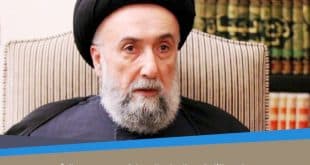



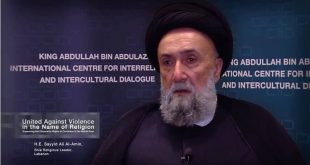




![الامين | صدور الجزء الرابع من كتاب [سلسلة الدروس في علم الاصول]](https://www.al-amine.org/wp-content/uploads/2017/03/سلسلة-الدروس-في-علم-الأصول-العلامة-السيد-علي-الأمين-310x165.jpg)
